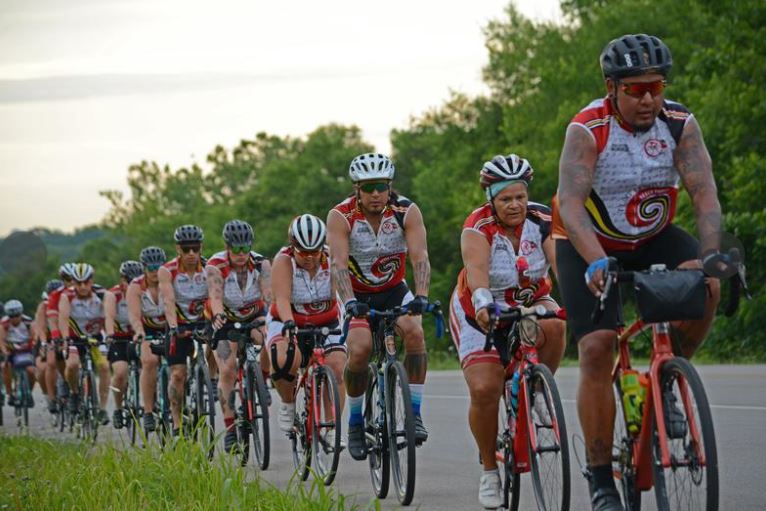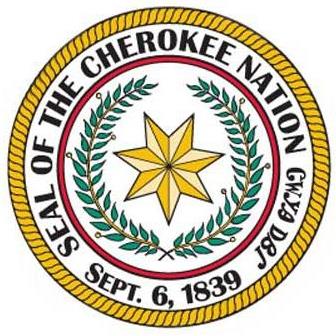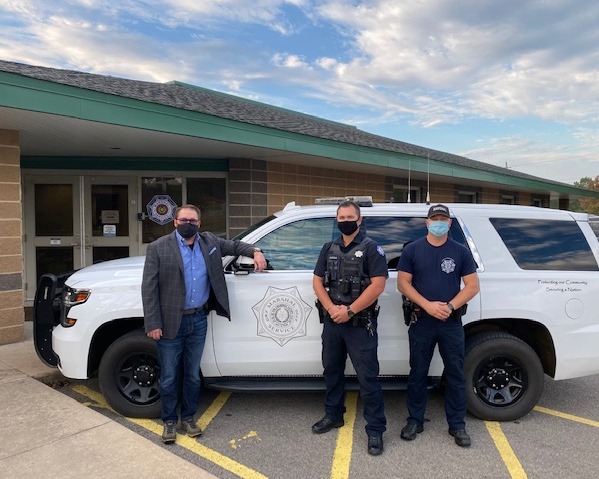Contact Us
To provide feedback on the Community Policing Dispatch, e-mail the editorial board at CPDispatch@usdoj.gov.
To obtain details on COPS Office programs, publications, and resources, contact the COPS Office Response Center at 800-421-6770 or AskCopsRC@usdoj.gov

U.S. Department of Justice
Office of Community Oriented Policing Services
Washington, DC 20530
 The COPS Office is pleased to feature the Cherokee Nation Marshal Service as the November 2020 winner of the Community Policing in Action Photo Contest. The winning photo shows Cherokee Nation Marshal Dustin Davis hugging cyclist Monica Tafoya in 2019 after ending their 1,000-mile Remember the Removal bike ride from Georgia to Oklahoma retracing their ancestors’ journey on the Trail of Tears.
The COPS Office is pleased to feature the Cherokee Nation Marshal Service as the November 2020 winner of the Community Policing in Action Photo Contest. The winning photo shows Cherokee Nation Marshal Dustin Davis hugging cyclist Monica Tafoya in 2019 after ending their 1,000-mile Remember the Removal bike ride from Georgia to Oklahoma retracing their ancestors’ journey on the Trail of Tears.
“It was inspiring,” said Dustin Davis, a Cherokee Nation (CN) Marshal who accompanied 18 cyclists—nine from the Cherokee Nation in Oklahoma and nine from the Cherokee Nation in North Carolina—on the annual Remember the Removal (RTR) bike tour in 2019. “The kids came together as a great team and were very supportive of each other. We met a lot of people along the way, who were very welcoming, and local law enforcement was very supportive too. Many didn’t know about the removal, so it was an eye opener for them and they all thought what we were doing was awesome.”
Started in 1984, the RTR tour commemorates the endurance of the thousands of Cherokee people who made the same journey in 1838–39, when they were removed from their homeland in our nation’s southeastern states and forced to resettle in what is now Oklahoma.
Young members of the tribe now retrace their path on the Trail of Tears National Historic Trail, which their ancestors traveled on foot, many dying of starvation and disease along the way. Throughout the 950-mile route, which takes the cyclists through seven states from Georgia to Oklahoma, they visit the unmarked graves of their ancestors and numerous other sites important to their people including New Echota, the ancient capital of the Cherokee Nation in Georgia.
To make sure there are no road closures or other problems, two marshals drive the route before the event; then during it, they follow the riders with their cars to provide security, fix flat tires, and manage other aspects of the trip.

The Gadugi Approach to Law Enforcement
 The RTR tour not only keeps young people’s sense of Cherokee identity strong but also unites participants in what the tribe calls Gadugi, the Cherokee word for working together in a cooperative effort. Historically used to describe group activities such as harvesting crops, it is now applied to a wide range of collaborative activities including law enforcement.
The RTR tour not only keeps young people’s sense of Cherokee identity strong but also unites participants in what the tribe calls Gadugi, the Cherokee word for working together in a cooperative effort. Historically used to describe group activities such as harvesting crops, it is now applied to a wide range of collaborative activities including law enforcement.
Says CN Marshal Shannon Buhl, “Cherokee culture and values are reflected in everything we do, and that means not only involving tribal members in maintaining order and safety but [also] keeping personal relationships strong. To say that we do community policing is an understatement; our community is our tribe, and our tribe is our family. So in a sense, we do family policing.”
This family feeling applies to the marshals’ service as well. All but three of the service’s 29 officers are Cherokee, and the remaining three belong to neighboring tribes. But all must learn Cherokee history and culture.
“It’s important to understand how members traditionally interact or react to things and to integrate these behaviors into our strategies and practices,” says Buhl. “Direct eye contact, for instance, is considered rude, and Cherokees tend to listen more than speak—which may lead law enforcement officers unfamiliar with our people to think a tribal member is lying or being uncooperative. Another important consideration is the Cherokee commitment to protecting the extended family, which often means anyone in the tribe. To build personal relationships, we take our marshals to stomp dances, powwows, tribal meetings, and other events. And we do a lot of things in the community to serve the people in ways other than with a badge and a gun, such as the polar plunge and an archery program for kids. We work with our elderly, too, helping them manage concerns about identity theft and elder abuse.”
As a result, the marshals are trusted by their tribe. An example Buhl gives is of a young man suspected of homicide, an offense that is prosecuted under federal jurisdiction in Indian country. Worried about how the Federal Bureau of Investigation (FBI) would treat the boy when arresting him, the community hid him until the Cherokee marshals arrived, then turned him over peacefully. Later, the boy’s mother hugged Buhl and told him she was very grateful for the respectful way the marshals treated him and the family.
Large Area, Few Marshals
 But what sets the marshals apart from other law enforcement is not just the tribal culture and values embedded in their approach but also the size and rural nature of their jurisdiction. The largest tribe in the United States, the Cherokee Nation has more than 141,000 Cherokee citizens residing within its 14-county, 9,000–square mile tribal jurisdictional area, which covers most of northeastern Oklahoma.
But what sets the marshals apart from other law enforcement is not just the tribal culture and values embedded in their approach but also the size and rural nature of their jurisdiction. The largest tribe in the United States, the Cherokee Nation has more than 141,000 Cherokee citizens residing within its 14-county, 9,000–square mile tribal jurisdictional area, which covers most of northeastern Oklahoma.
Says Buhl, “With fewer than 30 marshals to serve this area, we usually have to work alone, even when responding to violent crimes. And depending on where we are, backup can be two hours away. CN Marshals are a different breed of police officer; we’re as close to the Texas Rangers of the old west as you can get in modern times. We do some things differently than urban police because we don’t have the same safety net. We always try to tamp things down and not use excessive force. And generally speaking, that works, because Cherokees understand mutual respect and courtesy.”
The department provides de-escalation training in addition to the basic and advanced training CN Marshals receive from the Indian Police Academy at the Federal Training Center in Artesia, New Mexico.
Says Buhl, “We’re taught to enforce the law in compliance with federal, state, county, and municipal laws and ordinances. But we ask instructors to keep tribal considerations in mind, which gives us a more holistic approach to law enforcement.”
Asked if there are any special challenges to recruiting or hiring CN Marshals, Buhl said, “We can’t bring in as many officers as we need, because few applicants qualify. A CN Marshal must be able to work a variety of special operations jobs. We have a small force with a lot of land to cover, and cross training is a force multiplier. And even those who qualify can take a year to certify for these jobs.”
Special Operations Include a Category 3 FEMA Team
Currently, 23 of the CN Marshals’ 29 officers are certified to work on the Special Operations Team, which includes Swift Water Rescue and Dive units accredited as Category 3 Federal Emergency Management (FEMA) Incident Management Teams.
In addition to regular patrol and criminal investigation duties, CN Marshals work major crimes with the FBI and have two officers on the Safe Trails Task Force, which is a collaborative effort to target violent crime, drugs, gangs, and gaming violations in Indian Country.
The marshal service also has an air reconnaissance team for Search and Rescue operations. Four officers are authorized to fly up to 10,500 feet with a Paramotor, which is an engine with a paraglider strapped to their backs.
Says Buhl, “One officer can search 30 acres in five minutes, and if they spot someone, drop water, a first aid kit, and a GPS beacon. We have drones too, but they can’t drop things or search as large an area."
In addition to policing tribal lands, CN Marshals assist the Bureau of Indian Affairs (BIA) throughout Oklahoma and respond to calls in other states as part of FEMA teams. To enable these multijurisdictional activities, CN Marshals are cross-deputized with 50 municipal, county, state, and federal agencies.
“We work a huge territory and wear many hats,” says Buhl. But the job most important to all marshals is service to their tribe.
As with law enforcement in every community throughout our nation, understanding the values and culture of the people they serve enables CN Marshals to be more effective problem solvers, more trusted by tribal citizens, and better at preventing problems—providing community policing with a Gadugi approach.
For more information on this topic, see Policing on American Indian Reservations.
Written by Sr. Technical Writer Faye Elkins with contributions from Cherokee Marshal Shannon Buhl.
Subscribe to Email Updates
To sign up for monthly updates or to access your subscriber preferences, please enter your email address in the Subscribe box.






